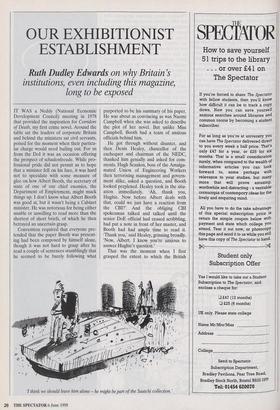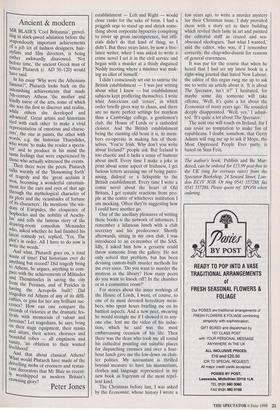OUR EXHIBITIONIST ESTABLISHMENT
Ruth Dudley Edwards on why Britain's
institutions, even including this magazine, long to be exposed
IT WAS a Neddy (National Economic Development Council) meeting in 1978 that provided the inspiration for Corridors of Death, my first crime novel. Around the table sat the leaders of corporate Britain and behind the ministers sat civil servants, poised for the moment when their particu- lar charge would need bailing out. For us from the DoI it was an occasion offering the prospect of schadenfreude. While pro- fessional pride did not permit us to hope that a minister fell on his face, it was hard not to speculate with some measure of glee on how Albert Booth, the secretary of state of one of our chief enemies, the Department of Employment, might muck things up. I don't know what Albert Booth was good at, but it wasn't being a Cabinet minister. He was notorious for being either unable or unwilling to read more than the shortest of short briefs, of which he then betrayed an uncertain grasp.
Convention required that everyone pre- tended that the paper Booth was present- ing had been composed by himself alone, though it was not hard to grasp after he read a couple of sentences stumblingly that he seemed to be barely following what purported to be his summary of his paper. He was about as convincing as was Naomi Campbell when she was asked to describe the plot of her novel. But unlike Miss Campbell, Booth had a team of anxious officials behind him.
He got through without disaster, and then Denis Healey, chancellor of the exchequer and chairman of the NEDC, thanked him genially and asked for com- ments. Hugh Scanlon, boss of the Amalga- mated Union of Engineering Workers then terrorising management and govern- ment alike, asked a question, and Booth looked perplexed. Healey took in the situ- ation immediately. `Ah, thank you, Hughie. Now before Albert deals with that, could we just have a reaction from the CBI?' And the obliging CBI spokesman talked and talked until the senior DoE official had ceased scribbling, had put a note in front of her master, and Booth had had ample time to read it. 'Thank you,' said Healey, grinning broadly. 'Now, Albert. I know you're anxious to answer Hughie's question.'
That was the moment when I first grasped the extent to which the British think we should leave him alone — he might be part of the Saatchi collection.' establishment — Left and Right — would close ranks for the sake of form. I had a priggish urge to stand up and shriek some- thing about corporate hypocrisy conspiring to cover up gross incompetence, but offi- cials didn't do that kind of thing, so I didn't. But three years later, by now a free- lance writer, when I was asked to write a crime novel I set it in the civil service and began with a murder at a thinly disguised Neddy meeting where a minister was mak- ing an idiot of himself.
I didn't consciously set out to satirise the British establishment — I was just writing about what I knew — but establishment subjects kept proffering themselves. I write what Americans call 'cosies', in which order briefly gives way to chaos, and there are no more perfect settings for mayhem than a Cambridge college, a gentlemen's club, the House of Lords or a cathedral cloister. And the British establishment being the cunning old beast it is, its mem- bers co-operate in making fun of them- selves. 'You're Irish. Why don't you write about Ireland?' people ask. But Ireland is too chaotic and it lacks a sense of humour about itself. Every time I make a joke in print about some aspect of Irishness, I get furious letters accusing me of being patro- nising, disloyal or a lickspittle to the British establishment. Every time I write a comic novel about the heart of Old Britain, I get ecstatic reactions from peo- ple at the centre of whichever institution I am mocking. Often they're suggesting how I could have another go.
One of the ancillary pleasures of writing these books is the network of informers. I remember a hilarious lunch with a club secretary and his predecessor. Shortly afterwards, sitting in my own club, I was introduced to an ex-member of the SAS. Idly, I asked him how a geriatric could throw someone from the gallery. He not only solved that problem, but has been devising custom-built murder methods for me ever since. `Do you want to murder the mistress in the library? How many peers do you want to knock off? In the chamber or in a committee room?'
For stories about the inner workings of the House of Lords, I went, of course, to one of its most devoted hereditary mem- bers, who spent hours briefing me on its battiest aspects. And a new peer, swearing he would strangle me if I showed it to any- one else, lent me the video of his induc- tion, which he said was the most embarrassing occasion of his life. Then there was the dean who took me all round his cathedral pointing out suitable places for dispatching enemies and over a four- hour lunch gave me the low-down on clois- ter politics. My accountant is thrilled beyond measure to have his mannerisms, clothes and language represented in my new book as fogeyism of the most repel- lent kind.
The Christmas before last, I was asked by the Economist, whose history I wrote a few years ago, to write a murder mystery for their Christmas issue. I duly provided them with a story set in their building which reviled their taste in art and painted the editorial staff as crazed and sex- obsessed ideologues. 'Just what I wanted,' said the editor, who was, if I remember correctly, the chap-who-dunnit for reasons of general cravenness.
It was par for the course that when he heard that I had set my latest book in a right-wing journal that hated New Labour, the editor of this organ rang me up to ask me to write an article about it. 'It is about The Spectator, isn't it?' I hesitated, for maybe some day someone will take offence. 'Well, it's quite a lot about the Economist of many years ago.' He sounded deeply disappointed. 'Well, yes,' I admit- ted. 'It's quite a lot about The Spectator.'
The next one will touch on Ireland, for I can resist no temptation to make fun of republicans. I doubt, somehow, that Gerry Adams will ring me up to ask if Mope, the Most Oppressed People Ever party, is based on Sinn Fein.
The author's book, Publish and Be Mur- dered, can be ordered for £15.99 post-free in the UK (ring for overseas rates) from the Spectator Bookshop, 24 Seward Street, Lon- don EC1V 3GB. Or ring 0541 557288, fax 0541 557288. Please quote ref SP056 when ordering.



























































 Previous page
Previous page